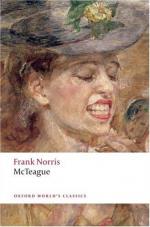|
This section contains 199 words (approx. 1 page at 400 words per page) |

|
Generally seen as a straight naturalistic novel in terms of its major themes, embodying such typical assumptions as biological determinism, atavistic degeneration, the influence of milieu, and the operation of chance, McTeague is considered to be one of the most important American novels of the 1890s to employ a naturalistic technique.
Scholarship has revealed numerous incidents and scenes that document the influence on this work of Zola's novels, in particular, of Therese Raquin (1881; original in French, 1867) for its study of an unhappy marriage between a nervous woman and a slow-witted man, of L'Assommoir (1879; original in French, 1877) for its description of a lower-class urban environment and for certain episodes like the wedding feast, and of Human Brutes (1890; La Bete Humaine, 1890) where an unrepentant murderer is also the victim of heredity alcoholism and insanity. Simultaneously, like all of Norris's fiction, McTeague is a peculiarly American novel which offers...
|
This section contains 199 words (approx. 1 page at 400 words per page) |

|




